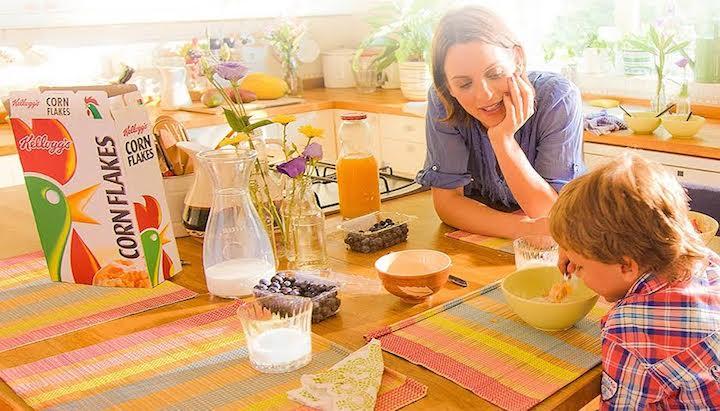
Kiwi breakfast eating habits revealed: One in five families report not eating breakfast together
5 August 2014, 2:53PM
Pead PR
The days of shared family breakfasts appear to be diminishing as busy Kiwi families struggle to find time to sit down and eat together.
A survey commissioned by Kellogg New Zealand has found that 20 per cent of respondents’ families don’t eat breakfast together. Meanwhile, the survey results show that one in five kids skip breakfast altogether once a week or more.
The survey also reveals more than half of those children who do eat breakfast are distracted from family interaction by things such as reading a book, watching TV or playing on a tablet while eating.
As part of the survey, around 300 New Zealand mothers with primary school-aged children were interviewed in July 2014 and asked about the breakfast eating habits of their families.
Kellogg’s brand manager Louise Scott-Davidson says she believes changing lifestyles are influencing how families treat what she considers to be the day’s most important meal.
“Breakfast used to be the time when families would sit down together. But for households with working parents nowadays, this is more commonly reserved for the weekends, or not at all,” Ms Scott-Davidson says.
“We are also concerned to see that 56 per cent of kids are distracted in one way or another while eating their breakfast. It is pleasing however to see 60 per cent acceptance of cereal and milk as a breakfast staple.
“However, the message of the importance of breakfast needs to get through to a lot more families,” Ms Scott-Davidson says.
“A serve of Kellogg’s cereal and a glass of milk at breakfast is quick and easy to prepare, and is relatively inexpensive compared to many other breakfast options. It can also provide up to 30 per cent of a young child’s daily needs of iron and calcium , which are important nutrients for developing brains and strong bones .
“Research has found that children who eat cereal are also more likely to meet their nutrient requirements for the day ,” Ms Scott-Davidson says.
President of the New Zealand Guild of Food Writers Trudi Nelson fully appreciates the benefits of a nutritious breakfast.
“As a busy mum of three boys, it’s extremely important to know they are starting their day off on the right foot,” says Ms Nelson.
“The iron and goodness they can get from their cereal and milk at breakfast helps keep their systems in good shape, while the milk is a great source of calcium, too .”
Other key findings from the survey include:
• 20 per cent of all respondents’ children skip breakfast once a week or more.
• 22 per cent of respondents’ kids eat breakfast away from home at least once a week (e.g. in the car or at school).
• One third of families eat breakfast together only on weekends.
• More than 20 per cent of families never eat breakfast together.
• 56 per cent of children are distracted while eating their breakfast e.g. reading a book, playing on a tablet or watching TV.
• 60 per cent of families eat cereal and milk at breakfast.
• Around seven out of 10 mothers interviewed say they eat a healthy, balanced breakfast four or more times a week, while only 57 per cent of fathers say the same.
• 65 per cent of respondents experienced challenges in getting their kids to eat breakfast such as “they don’t feel like eating breakfast”, “they are fussy eaters” and “we struggle to find healthy breakfast options within our budget”.
Ms Scott-Davidson says Kellogg’s has a commitment to providing less fortunate children with cereal through its Breakfast Buddies® programme.
“Breakfast Buddies donates free cereal to schools, sporting clubs and community groups to ensure kids who wouldn’t normally have the opportunity to enjoy nutritious foods such as cereal and milk at breakfast start the day the right way.”

About Kellogg ANZ:
Since 1924, Kellogg ANZ has been driven to enrich and delight consumers through foods and brands that matter. Kellogg is the world’s leading cereal company and our brands – Kellogg’s®, Be Natural®, Kellogg’s Corn Flakes®, Rice Bubbles®, Nutri-Grain®, Special K®, All-Bran®, Sultana Bran®, Coco Pops®, Pringles® and more – are welcomed into homes, nourishing families so they can flourish and thrive. Through our Breakfasts for Better Days® initiative, we’re providing 12 million servings of cereal and snacks in Australia and New Zealand and one billion servings of cereal and snacks globally – more than half of which are breakfasts – to children and families in need around the world by the end of 2016. To learn more about our corporate responsibility initiatives and our work to support local communities across Australia and New Zealand, visit www.kelloggs.com.au or www.kellogg.co.nz and follow us on Twitter @Kelloggs_AU.
_______
1Buzz Channel online survey with 301 completed responses, 5 - 6 July, 2014
2NHMRC NRVs 4-11 yrs, 2005. A serve of Kellogg cereal and 250mL milk typically has 3mg iron and 300mg calcium.
3Iron contributes to normal cognitive function in children as part of a healthy varied diet
4Calcium is necessary for normal bone structure as part of a healthy varied diet
5Deshmukh-Taskar PR. The relationship of breakfast skipping and type of breakfast consumption with nutrient intake and weight status in children and adolescents: The National Health and Nutrition Examination Survey 1999-2005. J Am Diet Assoc 2010; 110: 869-878. 6Calcium is necessary for normal nerve and muscle function and contributes to the normal function of digestive enzymes as part of a healthy varied diet.
Iron contributes to normal energy production and contributes to normal blood formation as part of a healthy varied diet.
